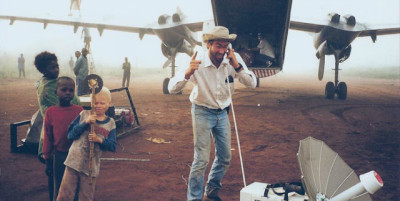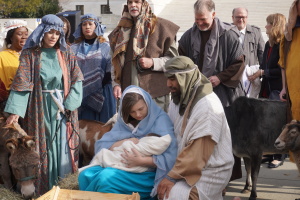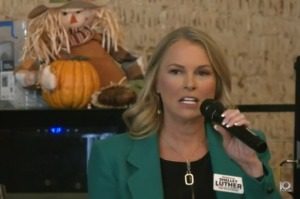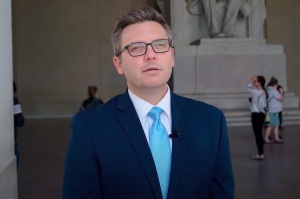Pat Robertson's Operation Blessing Issues Rebuttal of 'Mission Congo' Film Highlighting Nonprofit Exploitation Claims


"Death, diamonds and greed. A charismatic U.S. businessman pursues an irresistible opportunity during one of the worst humanitarian crises of modern times." So reads the description for "Mission Congo," the much talked-about documentary that revisits allegations that Marion Gordon "Pat" Robertson used Operation Blessing International (OBI), a medical and hunger relief charity, as a front to line his own pockets via the diamond mines of Zaire (now the Democratic Republic of Congo) during the Rwandan refugee crisis.
After initially threatening a lawsuit against all offending parties, Operation Blessing now has issued a lengthy statement challenging the "malicious allegations" made in the film.
"We find it necessary to respond to not only the overall theme that Dr. Robertson somehow profited 'on the back of a non-existent aid project,' as was erroneously reported in the media, but also to clear up specific falsehoods about Operation Blessing's activities and other malicious and defamatory comments that have been made in the film by the filmmakers," reads the statement sent to The Christian Post by Chris Roslan, a spokesperson for Operation Blessing International and also Robertson's representative.
The screenplay for "Mission Congo," which premiered at the Toronto International Film Festival on Sept. 6, was written by Lara Zizic and David Turner. The filmmakers previously created a documentary called "Children's Parliament" about Congolese youth that aired in 2010 on Al Jazeera. The pair was inspired this time around by a series of investigative reports from the '90s by Bill Sizemore, an award-winning journalist for The Virginia-Pilot.
The focus of the reports was Robertson's soliciting of donations on his "The 700 Club" program in 1994 for Rwandan refugees fleeing the civil war into Congo. Refugees were being aided by Operation Blessing and other, unaffiliated humanitarian groups. Sizemore's reports prompted a request from then-Democratic Sen. Janet Howell for an investigation by Virginia state authorities into Robertson and OB"s activities, which involved the nonprofit's resources being used to support Robertson's for-profit diamond mining venture in the country.
"Mission Congo" filmmakers interviewed Sizemore as well as those who said they were former Operation Blessing employees. They claimed that the nonprofit's resources were sometimes used to serve Robertson's private diamond digs through what OB calls his "personal business entity," the African Development Corporation (ADC).
Operation Blessing insisted in its statement Wednesday that Robertson's "total take" in the diamond venture was minimal, and confirmed that its own resources were occasionally used to transport ADC equipment to mining locations.
"The total take in the diamond mining operation was exactly one stone weighing about an eighth of a carat," reads the statement. "The effort was a total failure and was abandoned, with Dr. Robertson donating the equipment to the African church that owned the river concession. The operations of ADC resulted in a substantial personal financial loss to Dr. Robertson. Media reports suggesting that Dr. Robertson 'enriched' himself by diamond mining are grossly false."
Due to malfunctioning World War II planes initially purchased to serve ADC's purposes, "the missions were occasionally overlapped using whatever plane(s) was/were working," according to the faith-based charity. "The ADC plane was partly used to haul humanitarian supplies for OB, while the OB planes were partly used to haul freight for ADC. All usage of the OB planes for ADC purposes was fully paid for by ADC."
Robert Hinkle, interviewed by filmmakers and identified as Operation Blessing's chief pilot in Zaire (Congo) in 1994, paints a totally different picture in "Mission Congo," repeating claims he has made since the '90s when the allegations against Robertson first emerged.
Hinkle insisted that his work consisted of mostly transporting equipment to mining sites instead of delivering much-needed relief supplies to Rwandan refugees during the six months he served in the region. While Operation Blessing clarified Wednesday that Hinkle was never one of its employees, a statement attributed to Robertson in a 1997 Associated Press report insists Hinkle worked for the conservative Christian's for-profit ADC.
Relief workers from other nonprofit agencies working on the ground in Zaire at the time of the humanitarian crisis also paint a curious picture of Operation Blessing's activities in Africa. The following description of "Mission Congo" is from Kenneth R. Morefield's report from the Toronto Film Festival for Christianity Today:
"One of Robertson's critics in the film is Richard Walden, whose Operation USA shared in a Nobel Peace Prize. Also particularly damning is the testimony of Samantha Bolton from Doctors Without Borders, who claims Operation Blessing took film of DWB's relief efforts and broadcast it as their own work. Janet Howell, a State Senator from Virginia, weighs in on the origins of a Virginia Office of Consumer Affairs report that concluded Robertson and CBN made 'material claims' in their fundraising that were 'fraudulent.' There is also testimony from Robert Hinkle, identified as the 'chief pilot' of Operation Blessing, about what was actually in the planes that he flew. But perhaps most distressing was footage of Dumi, an agricultural compound that appears very different in the documentary's footage than it does in the pictures of the website soliciting donations for that project."
Virginia's Office of Consumer Affairs concluded in 1999 that Robertson's claims made on "The 700 Club" to solicit donations for Operation Blessing's relief work were misleading but not an intentional attempt to commit fraud. No official charges were brought against Robertson or his organization, and neither did the consumer affairs office recommend prosecution, as such authority lies with the attorney general's office and its lawyers.
Mark Earley, a former Prison Fellowship president who served as Virginia's attorney general at the time, was reportedly not directly involved in the consumer affairs probe due to concerns over his relationship with Robertson, who had donated to the fellow Republican's campaign. Lawyers in Earley's office recommended no legal action be taken, and concluded that Operation Blessing's main failure was "shoddy bookkeeping," according to a June 15, 1999, Associated Press report. Robertson championed the findings as vindication that he had done no wrong.
"Mission Congo" filmmakers Zizic and Turner reportedly invited Robertson to be interviewed for the film, but he rejected the offer, as he also apparently did with an invitation to appear on a post-premiere panel to discuss the documentary.
The documentary description on the Toronto International Film Festival's website concludes: "The film raises larger questions over the billions of dollars raised by American religious institutions that go untaxed and unregulated. Robertson's organization alone earns annual revenues in the hundreds of millions. If this story can bring about greater accountability, that would truly be a blessing."
Robertson founded Operation Blessing in 1978 and serves as its chairman of the Board of Directors. The nonprofit was listed by Forbes among the top 50 charities, has earned a four-star rating from Charity Navigator, and has been recognized many times for its humanitarian work.
Robertson, 83, is owner of several other properties, many of them 501(c)(3) organizations based in Virginia, where the televangelist was born and still lives. Among those properties are the Christian Broadcasting Network (CBN), which airs "The 700 Club" television program that often features Robertson's controversial commentaries, CBN News, Regent University, and the American Center for Law and Justice (ACLJ).
The ACLJ, headed by Jay and Jordan Sekulow, has been pivotal in drawing attention to the high-profile prosecution cases involving Iranian Pastors Saeed Abedini, a U.S. citizen, and Youcef Nadarkhani.
Regent University, which this summer partnered with T.D. Jakes School of Leadership, recently suffered the immediate resignation of its president Carlos Campo, who succeeded Chancellor Robertson in 2010. Campo insisted that there were no financial or moral issues on Regent's or his part that prompted his departure.
Roslan, spokesperson for Operation Blessing International and Robertson's representative, said he would relay The Christian Post's request for direct comments from the CBN chairman regarding his thoughts on the documentary. As of press time, no additional comment was offered.
The nonprofit's full remarks shared Wednesday with The Christian Post appears below.
***
FOR IMMEDIATE RELEASE
OPERATION BLESSING INTERNATIONAL RESPONDS TO MALICIOUS MISSION CONGO ALLEGATIONS
VIRGINIA BEACH, VA (September 10, 2013) – Operation Blessing International (OB) has issued the following statement in response to the malicious allegations in the film Mission Congo:
The premise of the so-called "documentary," Mission Congo, is based on alleged events of almost 20 years ago. Indeed, the film relies heavily on reports from 1) one local newspaper whose reporter has never, to our knowledge, even stepped foot in the region in question, and 2) is also based on interviews with individuals who were either not directly involved with the charity's operations or not aware of the intricacies of those operations.
We find it necessary to respond to not only the overall theme that Dr. Robertson somehow profited "on the back of a non-existent aid project," as was erroneously reported in the media, but also to clear up specific falsehoods about Operation Blessing's activities and other malicious and defamatory comments that have been made in the film by the filmmakers.
The following is a point-by-point refutation of some of the major misstatements in the movie and associated media reports:
-In Zaire, Operation Blessing was responsible for the medical needs of approximately 100,000 refugees from Rwanda. To launch this effort, Dr. Robertson personally paid to charter a DC8 airplane to ship 80,000 pounds of medicine to Goma. Over the following year, additional shipments of medicines and medical equipment were sent elsewhere in the country including one shipment with 12 tons of medicine that was donated to the government of Zaire on May 17, 1995.




























